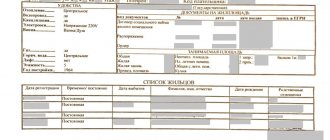About the opportunity
Yes, it is possible, both at the request of their parents and through judicial procedure .
Housing legislation does not prohibit the eviction of minors.
This is especially true for private privatized apartments, where the owner’s desire is enough for everyone else to leave the premises.
The situation is different with a municipal apartment. Only one thing is possible here - voluntary discharge of the child by the mother. In this sense, the board of trustees completely trusts her. It is impossible to forcibly remove a child from a non-privatized home, even through the courts.
Read about the grounds and procedure for eviction in our article.
What kind of assistance is provided by the state?
Children can be evicted only if there are compelling reasons.
An exception is a mortgage in which the actual owner is the bank. In this case, the housing is confiscated and sold regardless of whether the parents have other housing.
The private owner of the home, regardless of the reasons, must make sure that there is a place where the child will continue to live. This property must be safe and comfortable.
In legislation, the state provides certain support to vulnerable categories of the population. These include not only children, but also pensioners, disabled people or pregnant women. They are regularly supported by the state.
Important! The eviction of children from an apartment or house is a social problem in society, so quite often in practice the courts refuse this process even if the owner has good reasons.
Parents will have difficulties even with the sale of real estate where the minor is registered, since it is important to initially have another place to live.
Grounds and conditions
Based on judicial practice, the eviction of a child usually occurs for the following reasons :
- the owner is going to sell the housing (Article 292 of the Civil Code of the Russian Federation);
- termination of the parents' rights to use this living space (for example, the temporary registration period has expired);
- his parents are registered elsewhere;
- he ceased to be a member of the owner’s family, since the owner is divorced from his mother and the judge made a decision on alimony in favor of this child (Article 31 of the Housing Code of the Russian Federation).
A minor can be evicted either at the initiative of the owner of the square meters or at the request of the parents.
If the housing is municipal, then in both cases it is necessary to obtain the consent of the board of trustees. Without it, checkout from the apartment is impossible.
Where is the child being evicted? According to the law - to where his father and mother currently officially live (Article 20 of the Civil Code).
Read about the specifics of eviction from a service apartment, as well as eviction for debts, on our website.
Can minor children or with children be evicted?
In order to answer this question, it is necessary to determine on what basis the child lives in a particular apartment. The following options exist:
- the minor will live in the apartment on the basis of his share in it;
- the minor lives at the place of registration of his parents (legal representatives) in a privatized apartment, but is not the owner of even part of the premises;
- the minor lives in an apartment owned by the municipality;
- a minor is granted the right to use a service apartment allocated to his legal representatives
- the minor lives in an apartment that is pledged to a credit institution (mortgage).
It is definitely impossible to expel a minor from an apartment only in the first case, that is, when he is the owner. In all other cases there are chances. Let's look at each situation in more detail.
Prohibition on deprivation of housing
In what cases can small children be evicted? Eviction of a child is prohibited if:
- child co-owner;
- the consent of the guardianship authorities has not been obtained, although in this case it is required;
- municipal real estate;
- a child is a participant in privatization;
- a minor is an orphan or disabled;
- this is his only home.
You can learn about the cases in which people are evicted without providing other housing in our article.
On a voluntary basis
Here you can do without guardianship authorities - to evict a minor from the living quarters, it is enough for the mother to deregister ; in this situation, again, the central place is given to the notorious twentieth article of the Civil Code.
To do this, she comes to the passport office of the Management Company or the local police department, provides her passport and writes an application for registration. Moreover, it is not even a fact that she will indicate her actual place of residence.
However, it is still better to obtain the said permission . Especially if the mother and father are divorced and the father is vigilant about the conditions in which his child grows up.
If he objects to the child’s relocation, and even appeals to the board of trustees (or the Father’s Committee), they will take his side.
The consent of the board of trustees is also necessary if the child is planned to be registered in another place, not where the father and mother live, but, say, with the grandparents.
This is done, for example, when transferring a little person to a new school .
The standard procedure looks like this:
- An official representative (usually the mother) collects a package of documents.
- An application is submitted to the board of trustees.
- Within two weeks, the supervisory authority makes a decision.
- Now your son or daughter can be discharged and registered in another territory.
What documents are needed to obtain permission from guardianship?
The parent or guardian is faced with the task of convincing the regulatory authority that the child will not be homeless and in general his rights will not be infringed in any way.
This means that relocation is only possible to an equivalent living space.
That is, you will need:
- technical documentation for a new apartment;
- parent's passport;
- child's birth certificate;
- statement.
Protection of children's rights
Children's rights to residence depend on the legal status of the premises in the context of the rights of parents and their children, in particular:
- personal property factor (whether the child has a share);
- considered to be the residential property of his parents;
- accommodation on social rent terms.
According to the law, the eviction of minor children is assigned only to the judiciary, and the state, represented by the guardianship and trusteeship authorities, takes an active part in the courts. The legal regime of the premises is regulated by specific rules of law.
Naturally, eviction of a minor child will require documentary evidence of significant circumstances:
- Right to housing.
- Written confirmation of registration.
- Confirmation of family relationships.
- Identity documents.
It is quite possible that other documents will be needed: about marriage, about the birth of a child, justification for eviction, court decisions, if any.
The rights of the child, and first of all such an important right as acceptable living conditions, are protected especially closely by the court and the law.
Exceptions can only be in the context of “threat to health, life; living conditions do not correspond to basic sanitary standards, the territory is contaminated, the building is in disrepair, etc.” An exceptional case of an objective nature allows for the child to be evicted. But the task of providing housing is not removed by any exceptional circumstances.
The use of exceptional situations is considered by the court, first of all, in the context of probable unlawful actions of any person, including relatives (guardians), in relation to the rights of a minor.
Manipulation of children is not uncommon nowadays. Adults, especially during family troubles, scandals and divorce proceedings, often engage in outright speculation with their own children and, without hesitation, violate their legitimate interests.
We recommend that you read:
Is it possible to privatize an apartment for a minor child?
But this is not why the participation of guardianship and trusteeship authorities in court to protect the legitimate interests of minor children is common practice.
The participation of social authorities of the state is provided for by law.
Thus, a minor child can be evicted from an apartment if it is accompanied by the mandatory provision of housing that is not inferior in comfort to what it was.
Compulsory procedure
It is possible only through the court and only in situations where the small citizen is not a participant in privatization or a co-owner of the home. The claim is filed in the district court of general jurisdiction.
And the most reasonable option is to hire a lawyer. The matter ahead is very difficult, because the rights of the child and the constitutional human right to housing are affected (Article 40 of the Constitution of the Russian Federation).
The main documents required are the following:
- statement of claim based on the number of persons involved;
- general civil identity card;
- consent of the board of trustees;
- birth certificate or passport of a small citizen;
- state duty check;
- papers confirming the ownership of the apartment;
- extract from the house register;
- divorce certificate (if required);
- certificate from the registry office about family composition;
- a copy of the court decision awarding alimony.
It should be taken into account that the defendant can appeal the decision - he is given a month to do this.
You can try to do without ships altogether.
To do this, you first need to send residents a notice about the planned sale of living space , and then fulfill the promise.
With the money raised, a new one is bought, where the owner, of course, won’t register anyone else.
Well, the new owner of the sold property will deal with the encumbrance in the form of registered tenants - he will calmly discharge them through the court (Article 292 of the Civil Code of the Russian Federation, Article 31 of the Housing Code of the Russian Federation). However, the following points must be taken into account:
- square meters will significantly lose value;
- it is necessary to enlist the help of an experienced lawyer and entrust the matter only to a reputable real estate agency, so that interested parties do not have a chance to recognize the transaction as sham (Article 170 of the Civil Code of the Russian Federation).
The most risky option in this regard is considered to be if the apartment is planned not to be sold, but to be donated , after which the recipient, having written out all the unnecessary ones, gives it back to the first owner, already “clean”.
From mortgage
How is a minor child evicted from a mortgaged apartment?
There is an opinion that a minor will not be evicted, even if the bank forecloses on the mortgaged housing - especially if this apartment is the only home for the child.
At the same time, they refer to Article 446 of the Code of Civil Procedure of the Russian Federation, which prohibits lenders from turning their influence towards the only home of even persistent defaulters.
That’s all true, but in this case, the said article is not applicable - after all, this living space is not the property of the child, it belongs to a financial institution, which means nothing can prevent the owner from evicting people who are not related to him.
So the smartest option is to pay for the loan, no matter what it costs. The bank will not be lenient and, if something happens, will evict everyone, no matter what age they are.
Who can go to court
Eviction lawsuits must be initiated by someone. The following have the right to file a statement of claim on their own behalf:
- Property owners.
- Representatives of enterprises that are owners of real estate provided as office premises.
- Buyers of living space, after registering their rights in Rosreestr.
- Municipal authorities, if we are talking about demolition of a building.
- Credit organisation.
Claims can be brought directly from the owner or submitted through a representative. This person must have a power of attorney to represent the applicant's rights in court. The power of attorney must be notarized.
The evicted person can also apply to the court to protect his rights and defend the interests of minors. He may file counterclaims or present documentary evidence in the course of the case brought by the plaintiff.








